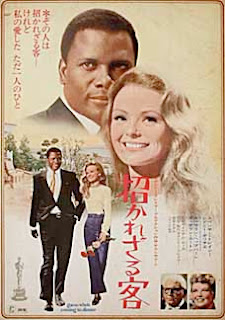
Watching Guess Who’s Coming to Dinner in class the other day was very interesting. The film starring Sidney Poitier was groundbreaking at the time of its release because it handled the issues of interracial dating and marriage in a way that had not been seen before. I was just surprised while watching the film to find that what was acceptable to say back in that time period is no longer acceptable. The United States have been greatly affected by the political correctness bug as of late, as is reflected in the recent remake Guess Who which flips the conceit and a new similar movie entitled Our Family Wedding which focuses on intermarriage between Blacks and Latinos. The film seems outdated in the way it treats the subject, but at the same time, one begins to wonder if anything has ever really changed. The discourse may use a different language, but issues are still relevant today. Movies like Crash emphasize that race is still a factor in our daily lives, and even in the excerpt of James Baldwin’s The Devil Finds Work we find that the same issues repeat themselves over time, even when we think we have evolved as a culture. Baldwin points out that nothing has changed from the moment in the film Birth of a Nation where a black maid tells a black congressman that she doesn’t like “n-words” that set themselves up above their station to the moment in Guess Who’s Coming to Dinner where the maid tells Sidney Poitier’s character the same exact thing in a more modern manner. It is just funny to realize that the only thing that has changed in the racial discourse is the way we say things. I am quite confident that if a film were to come out now with the same types of characters, they will continue this tradition. This also brings about a wider discussion about Blacks critiquing other Blacks, which tells that we may never be able to not have this conversation about race.
Questions
1.Is race really a big factor in Hollywood?
2.What are the repercussions of talking about race in Hollywood?
3.What would a true remake (not comic role-flip) of Guess Who’s Coming To Dinner look like today? Would it feature other races, or gay/lesbian relationships, etc.?
